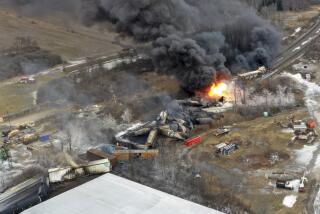Terrorism’s Tentacles
- Share via
The CIA’s annual assessment of worldwide threats to the United States is not recommended for relaxing bedtime reading.
George J. Tenet, the director of Central Intelligence, warned in testimony before Congress that the spread of missile technology is “more stark and worrisome” than ever. He singled out North Korea and Iran as working on long-range missiles that could be nearing the testing stage. Iraq, which since the breakdown of the United Nations weapons inspection system is suspected of having resumed work on a variety of prohibited weapons, might also develop an intercontinental missile sometime in the next decade.
Tenet cited Iran as “the most active state sponsor” of terrorism, despite some recent signs of moderating trends. Osama bin Laden, the exiled Saudi Arabian millionaire implicated in the 1998 bombings of two U.S. embassies in Africa, is known to be trying to get hold of chemical weapons. Tenet described Bin Laden as the foremost terrorist threatening the United States.
Well-heeled terrorists as well as renegade states now have better access than ever to high-technology equipment, scientific expertise--much of it provided by out-of-work specialists from the former Soviet Union--and, through computers, to once hard-to-come-by scientific information. The Central Intelligence Agency has expanded its efforts to detect and prevent the acquisition of chemical, biological and nuclear technology, but, said Tenet, “the hill is getting steeper every year.”
U.S.-Soviet competition produced an equilibrium in strategic weapons that encouraged mutual restraint. Rogue states and especially terrorists driven by ideological dogma or a sense of religious mission are not similarly inhibited. The best way to limit the threats cited by the CIA is through international cooperation to control the spread of missile technology and the materials needed for chemical, biological and nuclear weapons. But gaping holes exist in the fabric of cooperation, as Iraq’s earlier ease in acquiring an arsenal of terror weapons showed. This is not a battle the United States can wage alone. What’s unclear is how much help other nations are prepared to give.
More to Read
Sign up for Essential California
The most important California stories and recommendations in your inbox every morning.
You may occasionally receive promotional content from the Los Angeles Times.













